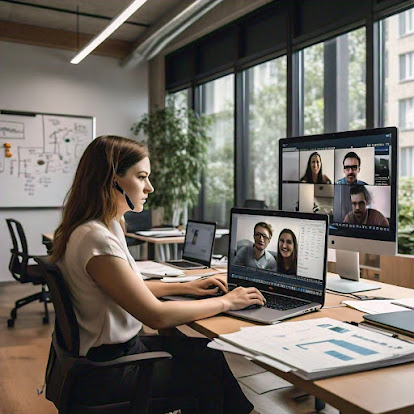The Impact of Modern Technology on Our Lives
In the past few decades, modern technology has transformed almost every aspect of our lives, revolutionizing the way we communicate, work, learn, and entertain ourselves. From smartphones and social media to artificial intelligence and the Internet of Things (IoT), technology has seamlessly integrated into our daily routines, shaping our personal and professional experiences. This article explores the profound impact of modern technology on our lives, highlighting both its benefits and challenges.
Communication and Connectivity
One of the most significant impacts of modern technology is the transformation of communication. The advent of smartphones, the internet, and social media platforms has made it easier than ever to stay connected with friends, family, and colleagues, regardless of geographical distances.
Instant Communication: Technologies like email, instant messaging, and video conferencing have replaced traditional modes of communication, enabling instant interaction and collaboration. Platforms like WhatsApp, Zoom, and Skype allow people to communicate in real-time, bridging the gap between personal and professional relationships.
Social Media: Social media platforms such as Facebook, Twitter, Instagram, and LinkedIn have revolutionized how we share information, stay updated with news, and build networks.
They have become essential tools for personal branding, marketing, and social interaction, transforming the way we connect and engage with the world.
Work and Productivity
Modern technology has significantly influenced the workplace, enhancing productivity and creating new opportunities for remote work and collaboration.
Remote Work: The rise of cloud computing, collaboration tools, and high-speed internet has made remote work a viable option for many professionals.
Tools like Slack, Trello, and Microsoft Teams facilitate seamless collaboration, allowing teams to work together from different locations.
Automation and AI: Artificial intelligence and automation technologies have streamlined various tasks, reducing the need for manual labor and increasing efficiency.
Digital Transformation: Businesses across industries are leveraging technology to enhance operations, improve customer experiences, and drive innovation. Digital transformation initiatives involve the adoption of technologies like IoT, big data, and blockchain to optimize processes and gain a competitive edge.
Education and Learning
Technology has revolutionized education, making learning more accessible, personalized, and engaging.
Online Learning: The proliferation of online learning platforms such as Coursera, edX, and Khan Academy has democratized education, allowing individuals to access courses from top universities and institutions worldwide. E-learning has become a valuable tool for lifelong learning and skill development.
Personalized Learning: Adaptive learning technologies use data analytics and AI to provide personalized learning experiences tailored to individual needs and preferences. This approach enhances student engagement and improves learning outcomes by addressing specific strengths and weaknesses.
Interactive Learning Tools: Modern technology has introduced interactive and multimedia-rich educational tools, such as virtual reality (VR) and augmented reality (AR), to make learning more immersive and enjoyable. These tools can simulate real-world scenarios, providing hands-on experiences that enhance understanding and retention.
Health and Wellbeing
Advancements in technology have had a profound impact on healthcare, improving diagnosis, treatment, and overall wellbeing.
Telemedicine: Telemedicine platforms enable remote consultations, allowing patients to access healthcare services from the comfort of their homes. This technology has proven especially valuable during the COVID-19 pandemic, ensuring continuity of care while minimizing the risk of infection.
Wearable Devices: Wearable health devices like fitness trackers and smartwatches monitor vital signs, physical activity, and sleep patterns, empowering individuals to take control of their health. These devices provide real-time data and insights that can help prevent and manage chronic conditions.
Medical Innovations: Cutting-edge technologies such as AI, robotics, and genomics are driving medical innovations, leading to more accurate diagnoses, personalized treatments, and improved patient outcomes. For example, AI algorithms can analyze medical images to detect diseases at an early stage, while robotic surgery systems enhance precision and reduce recovery times.
Entertainment and Lifestyle
Modern technology has transformed entertainment and lifestyle, offering new ways to relax, have fun, and enrich our lives.
Streaming Services: The rise of streaming platforms like Netflix, Spotify, and YouTube has revolutionized how we consume media. These services provide on-demand access to a vast library of movies, TV shows, music, and videos, allowing users to enjoy content anytime, anywhere.
Gaming: Advances in gaming technology, including virtual reality (VR) and augmented reality (AR), have created immersive gaming experiences that blur the line between the virtual and real worlds. Online gaming communities enable players to connect and compete with others globally, fostering social interaction and collaboration.
Smart Home Devices: Smart home technologies, such as voice assistants (e.g., Amazon Alexa, Google Home) and IoT devices, have made it easier to manage and control household tasks. These devices can automate lighting, temperature, security, and entertainment systems, enhancing convenience and efficiency.
Challenges and Considerations
While modern technology offers numerous benefits, it also presents several challenges and considerations that need to be addressed.
Privacy and Security: The increased use of digital technologies has raised concerns about data privacy and cybersecurity. Protecting personal and sensitive information from cyber threats is a critical issue that requires robust security measures and regulations.
Digital Divide: Access to technology is not universal, and the digital divide continues to be a significant challenge. Ensuring equitable access to technology and bridging the gap between different socioeconomic groups is essential for inclusive development.
Dependence and Addiction: The pervasive use of technology can lead to dependence and addiction, affecting mental health and wellbeing. It is important to promote healthy digital habits and find a balance between technology use and other aspects of life.




No comments:
Post a Comment